![Bilgin Çelik, Dağılan Yugoslavya sonrasıKosova ve Makedonya Türkleri [Kosovo and Macedonian Turks after the Disintegration of Yugoslavia]. Antalya: Yeniden Anadolu ve Rumeli Müdafaa-i Hukuk Yayınları, 2008, 180 p.](/api/image/getissuecoverimage?id=picture_2015_22003.jpg)
We kindly inform you that, as long as the subject affiliation of our 300.000+ articles is in progress, you might get unsufficient or no results on your third level or second level search. In this case, please broaden your search criteria.
![Bilgin Çelik, Dağılan Yugoslavya sonrasıKosova ve Makedonya Türkleri [Kosovo and Macedonian Turks after the Disintegration of Yugoslavia]. Antalya: Yeniden Anadolu ve Rumeli Müdafaa-i Hukuk Yayınları, 2008, 180 p.](/api/image/getissuecoverimage?id=picture_2015_22003.jpg)
Les premières élections locales en Roumanie post-communiste ont eu lieu en Février 1992. Gagnant à Cluj-Napoca a été un parti nationaliste, PUNR, qui a obtenu, en plus de la Mairie, le plus grand nombre de sièges au Conseil municipal. La réunion inaugurale du nouveau Conseil a eu lieu le 14 Mars dans un état de tension constant.
More...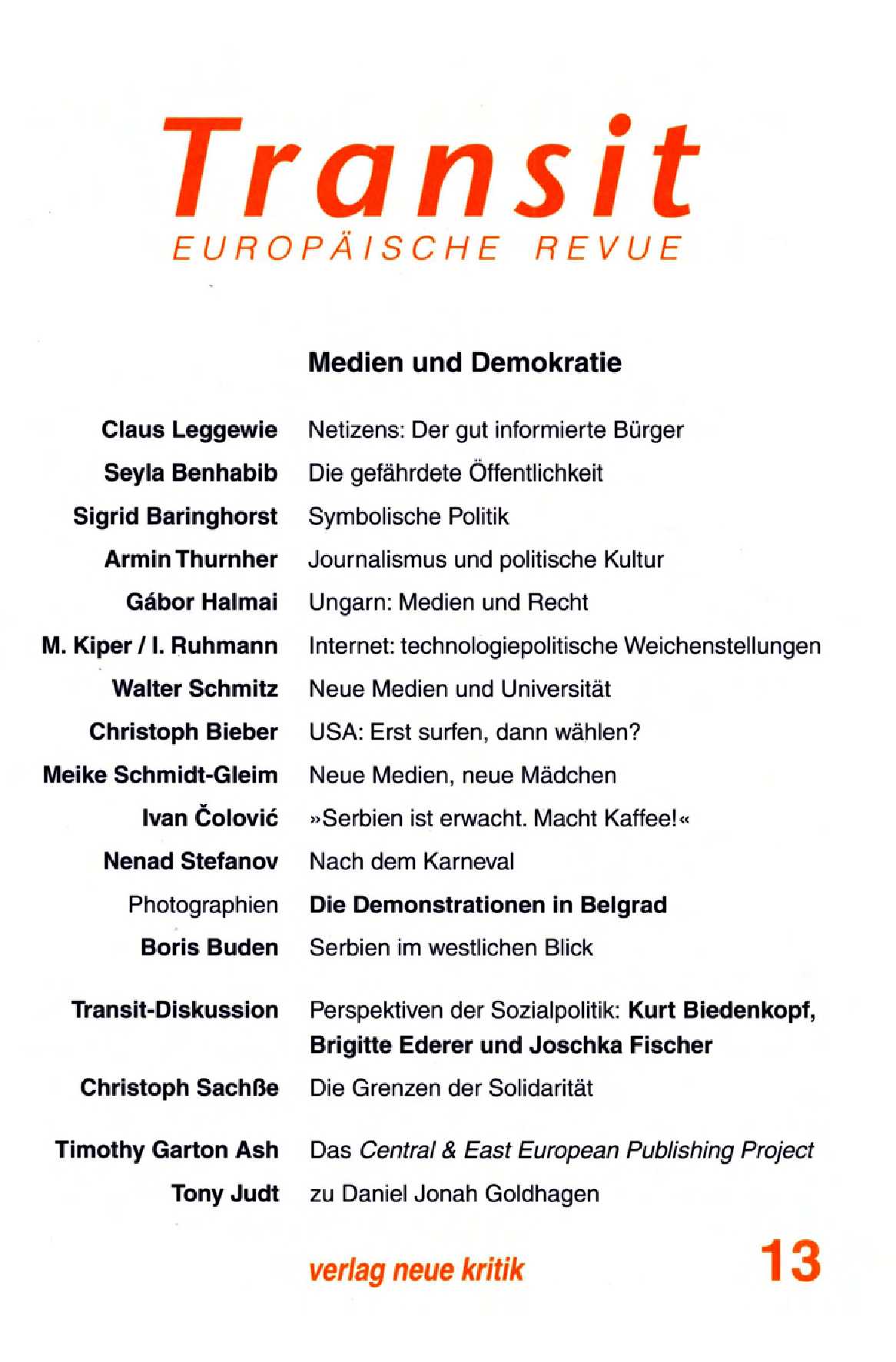
Demokratie und neue Medien, das ist wie alter Wein in neuen Schläuchen. Der Wein, also die Demokratie, ist alt und gut, wenn auch vielleicht nur mit dem Prädikat Winston Churchills, daß sie die schlechteste Regierungsform sei mit Ausnahme aller anderen. Nach ihrem Triumph über faschistische Diktaturen, autoritäre Militäroligarchien und »Volksdemokratien« hat sich die repräsentative Demokratie als Norm durchgesetzt. Als ob ihr dieser Sieg nicht gut bekommen wäre, mehren sich jedoch die Klagen über das Versagen der Demokratie, der es offenbar schwerfällt, akute Probleme moderner Gesellschaften - von der Massenarbeitslosigkeit über die Umweltverschmutzung bis zu ethnischen und religiösen Konflikten - in den Griff zu bekommen.
More...
Der Problemdruck der politischen Eliten wächst: Korruptionsvorwurf und Klientelismusverdacht haben ihr Ansehen in vielen Demokratien in Verruf gebracht. Wohlstandswachstum und Bildungsexpansion steigerten einerseits die politischen Partizipationsansprüche der Bürger, andererseits schärften sie das kritische Bewußtsein gegen die Machtvergessenheit und Machtversessenheit der Parteien und gewählten Repräsentanten. Mit der Herausbildung des modernen Wohlfahrtsstaats stieg die allgemeine Erwartungshaltung an die Leistungsfähigkeit des politischen Systems. Zugleich nahm jedoch die Einlösungskompetenz der politischen Funktionseliten deutlich ab: Je komplexer die gesellschaftliche Realität, desto unempfänglicher wird sie für politische Steuerungsinterventionen. Zudem fehlt dem Staat, wie nicht zuletzt die harten Auseinandersetzungen zur Sanierung öffentlicher Haushalte demonstrieren, immer häufiger die finanzielle Basis, um kostenträchtige Reformvorhaben zu initiieren.
More...
Die folgenden Überlegungen beschäftigen sich nicht medientheoretisch mit Fragen wie: »Was machen wir mit dem angebrochenen Weltalter?« Sie kümmern sich nicht um bereits überschrittene Rubikone zwischen alphabetischer und numerischer Seinsweise, sie überlassen es anderen, aus dem Ende der Gutenberg-Galaxis und dem Beginn der Welt des Hypertexts ihre Schlüsse zu ziehen. Sie gehen von einer Annahme aus, die unter den Bedingungen dieser aufziehenden Welt möglicherweise nicht haltbar ist. Diese Annahme stellt aber die Existenzgrundlage von Journalismus dar, sie bildet die Rechtfertigung für den verfassungsmäßigen Schutz der Meinungsfreiheit, sie ist der Kern dessen, was man Öffentlichkeit nennt. Sie lautet: Journalismus ist als Raum, in dem Bürger und Regierende miteinander kommunizieren und einander informieren können, notwendiger Bestandteil der Demokratie.
More...
Spätestens im September 1996 schien es, als könnten die Amerikaner nicht länger auf die Jahrtausendwende warten. Die National Conventions der beiden großen Parteien wurden aufwendig im Internet präsentiert, Bob Dole rezitierte WWW-Adressen und Bill Clinton wollte digitale Brücken ins 21. Jahrhundert bauen - der Wahlkampf war in vollem Gange und erreichte erstmals auch das Internet. Nachdem sich inzwischen die Staubwirbel im Datenraum gelegt haben, wirft eine Rückschau auf die politischen Netz-Aktivitäten des Wahljahres 1996 einige Fragen auf: Kann man mit Blick auf die Campaigning Sites der beiden Konkurrenten Dole und Clinton wirklich vom großen Schlagabtausch im Cyberspace reden? Welchen Stellenwert hatte die Wahlberichterstattung in der noch jungen Online-Medienlandschaft? Was geschah während der TV-Rededuelle der Präsidentschaftsanwärter oder in der Wahlnacht im Netz? Und: Hatten die virtuellen Werbeversuche der Kandidaten überhaupt eine Resonanz?
More...
Beinahe vier Monate lang, von der zweiten Novemberhälfte 1996 bis Mitte März diesen Jahres, »sendeten« die Bürger und Studenten, die gegen das Regime Slobodan Milosevics protestierten, eine Vielzahl von Botschaften, verpackt in Deklarationen, in Appelle, Stellungnahmen und Resolutionen. Die wichtigsten und interessantesten Botschaften jedoch artikulierten sich in der symbolischen Kommunikation der friedlichen Demonstrationen auf den Belgrader Straßen und in anderen Städten in Serbien: Slogans, Parolen auf Transparenten oder Buttons, Reime und Lieder, nonverbale Formen wie Gesten, inszenierte Spiele, Karikaturen, Puppen, Skulpturen und Masken, die alles überlagernde Kakophonie aus Trillerpfeifen, Trompeten und Kochtöpfen. Alle diese Botschaften waren zunächst einmal an das Regime gerichtet, an seine Führung, seine Verbündeten und Helfer. Aber auch die oppositionellen Parteien und deren Führungspersonen waren angesprochen. Und viele dieser Botschaften gingen gleichzeitig an Europa und die ganze Welt. Und nicht zuletzt tauschten die Teilnehmer diese Botschaften auch untereinander aus: Der Protest in Serbien war eine einzige große Bühne, auf der die Sender der Signale gleichzeitig ihre Empfänger waren.
More...
In der medialen Öffentlichkeit hat sich der Schrecken der Bilder vom Krieg in Bosnien in der bewährten Aneinanderreihung von Katastrophenreportagen aufgelöst. Unlängst brachte eine englische Boulevardzeitung auf der Titelseite ein Photo von verkohlten Autowracks mit der Schlagzeile »Like in Bosnia«; erst die nächste Zeile klärte darüber auf, daß es sich um einen Autounfall bei Liverpool handelte. Der Krieg ist zu einer Metapher geworden, die weitere Erklärungen erübrigt. Man hat sich daran gewöhnt, im ehemaligen Jugoslawien eine Region zu sehen, die mit einer geheimnisvollen Regelmäßigkeit von barbarischen Stammesfehden heimgesucht wird. Diese ethnizistische Wahrnehmung zeigte sich zuletzt wieder bei der Krise in Albanien: Sofort wird nach ethnischen oder religiösen Mustern gesucht, die natürlich auch gefunden werden.
More...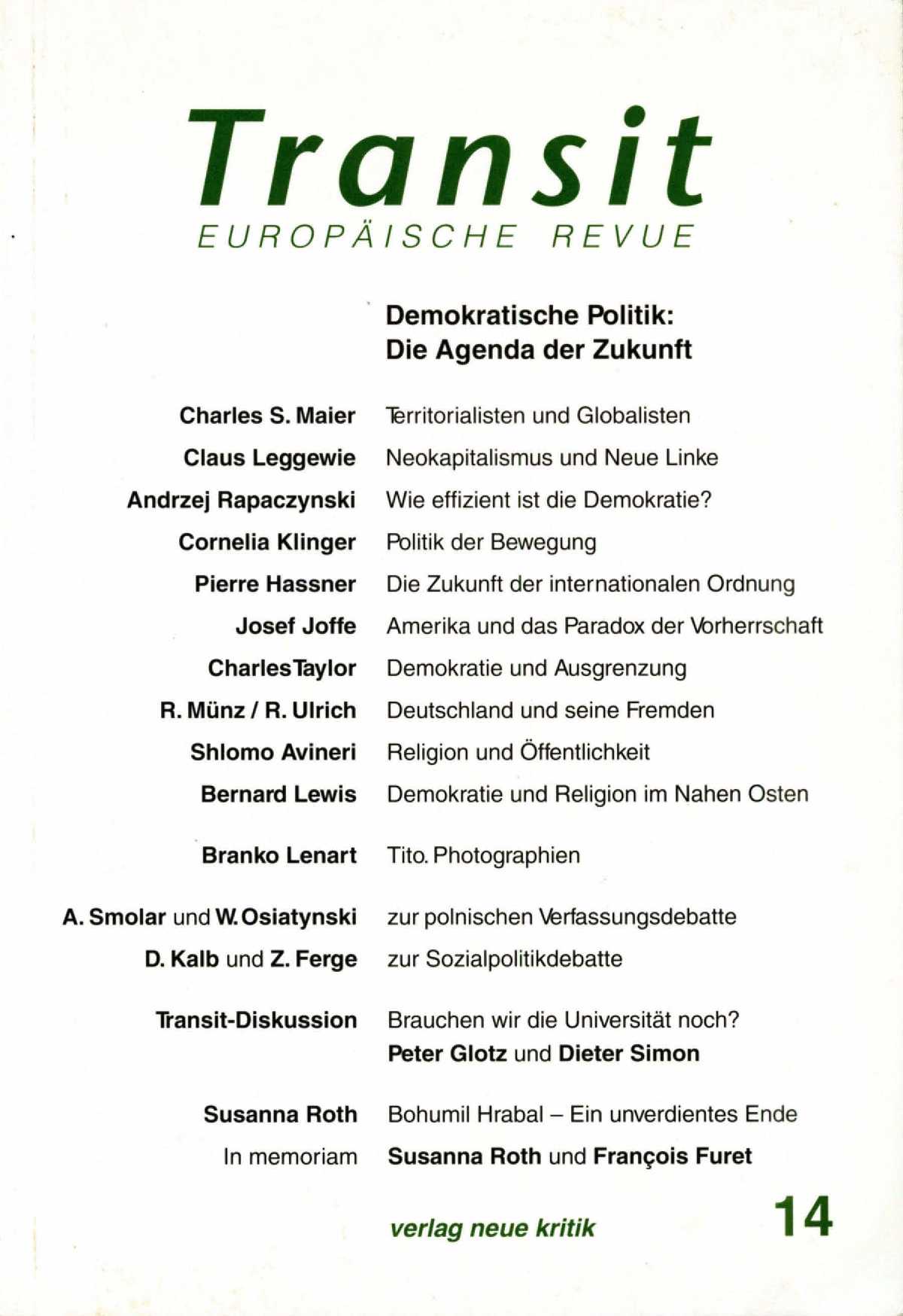
Wieviel Zuwanderung verträgt das Land? Wie viele Migranten können und wollen wir auf Dauer integrieren? Wie vielen wollen wir Schutz gewähren? Wer heute in Deutschland oder anderswo in Westeuropa solche Fragen stellt, bekommt alles mögliche zu hören, nur keine positiven Antworten. Denn in den reichen Ländern unseres Kontinents ist die Mehrheit der stimmberechtigten Bürgerinnen und Bürger gegen weitere Zuwanderung und gegen eine liberalere Handhabung des Asylrechts. Manche würden am liebsten auch diejenigen Zuwanderer wieder heimschicken, die in den letzten Jahrzehnten zu uns kamen oder die wir selbst ins Land geholt haben. All jene, die vor weiterer Zuwanderung warnen und fordern, Deutschlands Grenzen und die der anderen EU-Staaten müßten endlich dicht gemacht werden, können sich daher der Zustimmung der schweigenden Mehrheit und einer lautstarken Minderheit sicher sein. Das belegen sowohl Umfragen als auch Wahlergebnisse und eine verringerte Toleranz gegenüber Einwanderern im Alltag.
More...
Der amerikanische Gelehrte Samuel Huntington prophezeit, daß internationale Konflikte künftig nicht auf wirtschaftlichen Interessen oder unterschiedlichen Ideologien, sondern auf dem Zusammenprall einander feindlicher Kulturen beruhen werden. Angesichts dessen, was in der national-katholischen Presse anläßlich der Kampagne vor dem Verfassungsreferendum im Frühjahr 1997 zu lesen war, was Pfarrer und Bischöfe in zahlreichen Predigten verbreiteten und was Politiker der Rechten in Kundgebungen sagten, konnte man den Eindruck gewinnen, als werde Polen von einer anderen Kultur bedroht.
More...
Es liegt nun mehr als zwei Jahrzehnte zurück, daß Milton Friedman und seine Chicagoer Schule mit ihrer Kritik des Wohlfahrtsstaats einen Siegeszug um die Welt antraten. Sie lieferten die Leitlinien für die Programme neokonservativer Politiker wie Thatcher, Reagan und Pinochet, und später auch für die osteuropäischen Schock-Therapeuten. Von den Akademikern zeigten allerdings damals nur die Ökonomen Begeisterung für Slogans wie Thatchers berühmten Ausspruch »So etwas wie Gesellschaft gibt es nicht«. Heute jedoch, wo die radikalen Befürworter einer laisserfaire-Politik eher kleinlaut geworden sind, melden sich andere Disziplinen zu Wort. SozialwissenschaftIer unterschiedlicher Couleur reagieren in einer paradoxen, ja perversen Weise auf die von den Marktideologen freigesetzten Kräfte der Globalisierung und Individualisierung und steuern nun ihre eigene radikale Kritik am Wohlfahrtsstaat bei. Und obwohl sie den Individualismus, der mit einer deregulierten Marktgesellschaft einhergeht, keineswegs begrüßen, zweifelt doch kaum einer daran, daß der Sozialvertrag der Nachkriegszeit ausgelaufen ist.
More...
Michalski: Herr Simon, Sie sind seit kurzem Präsident der Berlin-Brandenburgischen Akademie der Wissenschaften; als Vorsitzender des Wissenschaftsrats der Bundesrepublik Deutschland haben Sie vor einigen Jahren mit Ihrer Bemerkung, die Universitäten seien »im Kern verrottet«, einiges Aufsehen erregt. Herr Glotz, Sie sind Gründungsrektor der Universität Erfurt; Ihr letztes Buch nimmt Simons Diktum schon im Titel auf.1 Wir haben Sie beide eingeladen, heute über die Frage »Brauchen wir die Universität noch?« zu diskutieren.
More...
»Wahrscheinlich wird die Tatsache für immer am tschechischen Volke haften bleiben, daß es seine bedeutendste Schriftstellerin in Armut und Elend hat zugrunde gehen lassen. «Diesen Satz schrieb Karolina Svetla 1862 kurz nach Bozena Nemcovas pompösem Prager Begräbnis über ihre Freundin und Dichterkollegin. Ich weiß nicht, weshalb er in Zusammenhang mit Bohumil Hrabals plötzlichem Tod vor mir aufgetaucht ist. Doch auf einen zweiten Blick gibt es Gemeinsamkeiten zwischen den so unterschiedlichen Schicksalen: Beide Künstler, von den einfachen Menschen verehrt und von den Machthabern geächtet, waren schon zu Lebzeiten Legenden, doch als Krankheit und Einsamkeit ihr Dasein bestimmten und ihre Schaffenskräfte lähmten, zog sich der Großteil der Gesellschaft lieber von ihnen zurück.<
More...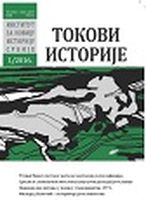
The goal of the paper is to analyze all the available data about the mass murder of 14 Serbian civilians from the village Staro Gracko and vicinity who went to the fields to harvest on 23 July 1999. The importance of the paper is to determine facts reliably and eliminate the irrelevant ones, emphasize direct circumstances and describe the whole case.
More...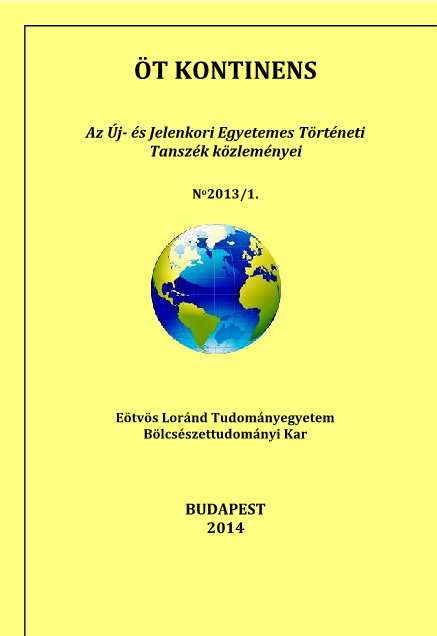
The Sino-American relations underwent some crucial changes during the presidency of George Herbert Walker Bush (January 20 1989 – January 20 1993). The newly elected president was greeted as an ’old friend’ by the leaders of the Chinese Communist Party, who put his belief in making the relationship between the two countries more intense. Still, by the end of the Bush era, trust between the two countries had already got to such a low level that had not been experienced since the normalization of 1972. The aim of the present study is to examine the changes which made the Chinese supervise their foreign policy continuously and re-evaluate the new international situation from the view of the Chinese government.
More...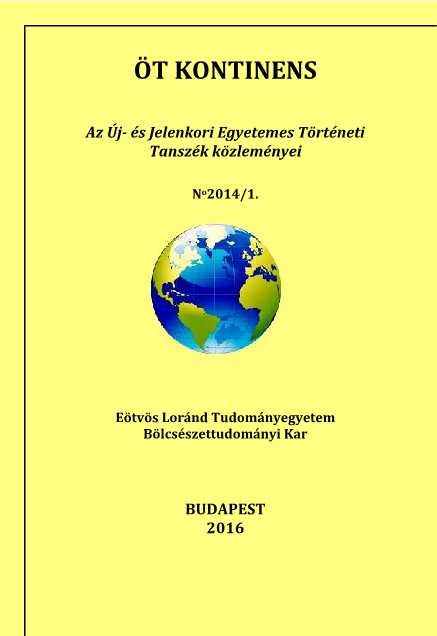
At the dawn of major geopolitical transformations in Europe and on the eve of 1990, French President François Mitterrand, well-aware of the shifting political and economic conditions in Central and Eastern Europe as well as in the USSR, and worried about the future of the European Economic Community, calls for the creation of a new pan-European structure – The European Confederation - designed to « associate all states of the continent into a common and permanent organisation for exchanges, peace and security ». In the weeks following its presentation, the project, in line with the gaullist tradition of a greater Europe « from the Atlantic to the Urals », is rather well-received by European political leaders. However, as time goes by, it has to face growing criticism and skepticism from the international community before ultimately being buried after the summer of 1991. Based on the archives of the French presidency and Ministry of Foreign Affairs, the Hungarian National archives and the documents from the François Mitterrand Institute in Paris, this article will deliver a brief overview of the background and origins of Mitterrand's European Confederation project before focusing on its reception by Hungarian political leaders and media during the course of the years 1990 and 1991.
More...
The last parliament of the GDR, the 10. Volkskammer, existed only from March to October 1990 and was undoubtedly different from those in other eastern European communist countries. This had to do with its special situation as the parliament of one half of a former united nation. After the victory of the conservatives in the election of March 1990 it was clear that the majority of voters wanted unification with West Germany according to Art. 23 of the German Constitution and as quickly as possible. This meant reunification by accession of the GDR to the Federal Republic. It was the Volkskammer’s main task to organize this process. Given that the 400 newly elected MPs were completely unexperienced following the model of the German Bundestag was probably the only way to be able to tackle the problems they were faced with. But this meant too that there was little room and no time to develop own solutions to their problems. Critics saw the massive support by West German political parties and institutions as a form of colonization. And a lot of MPs too were highly critical of their work. A feeling of lack of influence and powerlessness was widespread. But, as the example of the reintroduction of the five Länder shows, both sides could pull in the same direction too. This article tries to answer the question whether this parliament was only an assiduous student of its West German master or despite the circumstances able to develop its own culture and its own pace.
More...
The main goal of this paper is to provide a descriptive analytical overview of the existing evolution of the Slovenian parliamentary arena since its transition to democracy and independence. The paper is divided into two main parts: (1) an overview of a normative insight into the parliamentary and party system, and (2) an analytical assessment of the structure of the parliamentary arena as it is reflected in electoral and parties’ choices and policy preferences. A look at the contemporary democratic parliamentary arena in Slovenia shows that it, in itself, has been quite stable, while, on the contrary, its main integral parts – political parties – have gradually become less stable and less predictable, especially in the second decade of democracy, which can potentially influence the future stability of parliamentary arena, too.
More...
The following contribution discusses the wartime events in Gornja Radgona in the early summer of 1991, belonging to the framework of securing the plebiscitary decision of the Slovenian nation of December 1990. The emphasis lies especially on the operations of the Territorial Defence and Yugoslav People’s Army, while certain activities of what was then the Slovenian militia are also mentioned. The contribution also briefly outlines the events leading to the military conflict in the Slovenian territory. The article is mostly based on testimonies collected by the competent bodies in charge of the judicial proceedings against the Yugoslav People‘s Army officer operating in the area of Gornja Radgona. As stated by one of the witnesses in the proceedings, a Territorial Defence officer, many orders were passed down the chain of command orally, therefore the aforementioned testimonies are all the more important. unfortunately, people‘s memories fade with years. Furthermore, every individual sees the events he takes part in from his own viewpoint, which is why the testimonies also contain certain differences. Deviations in the testimonies, more relevant for this article, are mentioned in the text or in the footnotes. The author of the contribution does not attempt to answer the question whether war crimes have been committed in Gornja Radgona or not.
More...